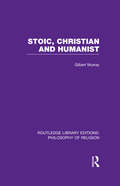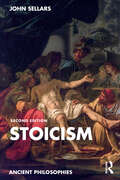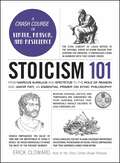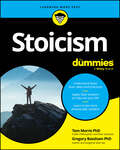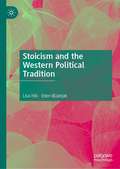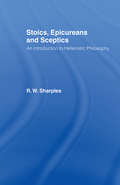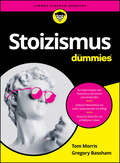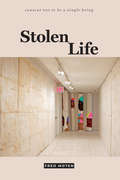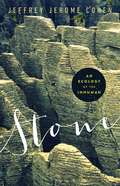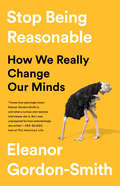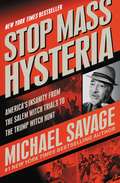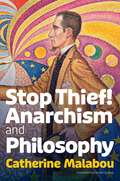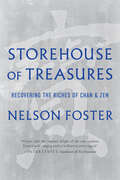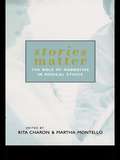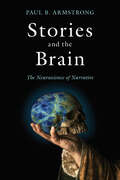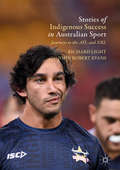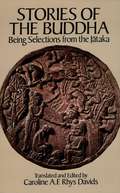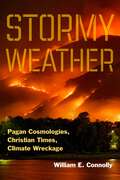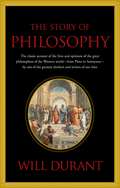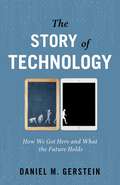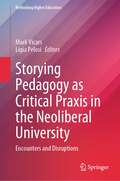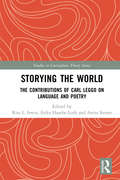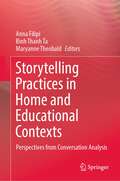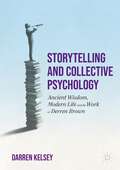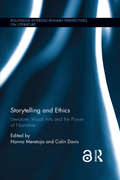- Table View
- List View
Stoic, Christian and Humanist (Routledge Library Editions: Philosophy of Religion)
by Gilbert MurrayThis book collects together four essays by the very well-known academic Gilbert Murray that were first presented between 1914 and 1939. The author seeks to present a statement of his profound belief in ethics and disbelief in revelational religions. The philosophy of this great thinker is accessibly written while it addresses deep questions of the nature of morality and the basis of religions. This collection was first published in 1940.
Stoicism (Ancient Philosophies)
by John SellarsThis new edition of Stoicism provides an introduction to one of the most influential schools of philosophy in antiquity, the influence of which has persisted to the present day.Originating in Athens around 300 BCE, Stoicism flourished for some five hundred years and has remained a constant presence throughout the history of Western philosophy. This new revised edition takes into account the wealth of scholarship that has been published in the last 20 years and the explosion of interest in Stoicism as a practical guide for living today. It begins with a complete introduction to the ancient Stoics, their works, and how they formulated their own philosophical system. The chapters then thoroughly examine the three core branches of Stoic philosophical doctrine – logic, physics, and ethics – while the final chapter provides an account of the Stoic legacy from later antiquity to now. The book also includes a chronology, useful glossaries, and a guide to further reading.This accessible, authoritative guide is an ideal introduction to the philosophy of Stoicism that stands behind much of the practical advice offered by Seneca, Epictetus, and Marcus Aurelius, suitable for students and general readers.
Stoicism 101: From Marcus Aurelius and Epictetus to the Role of Reason and Amor Fati, an Essential Primer on Stoic Philosophy (Adams 101 Series)
by Erick ClowardDiscover all the essential wisdom of the stoics with this engaging, informative, and easy-to-understand guide to all the key philosophers, concepts, and principles of the stoic philosophy.You&’ve seen the memes and quotes everywhere—from Reddit to TikTok—but what is stoicism really about? Stoicism 101 teaches you everything you need to know about this influential philosophy—from its key figures (including Epictetus, Seneca the Younger, and Marcus Aurelius), to its key principles (virtue, mindfulness, and the dichotomy of control). This easy-to-read guide uses engaging, straightforward lessons to teach you all the important stoic concepts. Whether you are new to stoicism or have been studying it for some time, in this book you&’ll find quick, thorough, easy-to-understand explanations of stoic philosophies and practices such as mastering desires and emotions, cultivating character and virtue, learning self-acceptance, dealing with criticism and adversity, practical exercises for achieving happiness, and more.
Stoicism For Dummies
by Tom Morris Gregory BasshamThe philosophy that will help you become more resilient in the face of life’s challenges Stoicism For Dummies will teach you the basic principles of stoic philosophy and show you how it can help you navigate the ups and downs of life. We all face challenges and setbacks, and, if we have the right mindset, we can sail through them with ease. This book offers a comprehensive look at Stoic philosophy, uncovering its strengths and attractions and shedding light on its limitations, both in the ancient world where it was developed, and in our world today. Learn how you can apply stoic principles for personal growth and better living, and how you can adapt this philosophical outlook to your unique circumstances. Written in terms anyone can understand, this friendly Dummies guide helps you understand stoicism, and also apply it in your life. Understand the basics of stoic philosophy, including virtues and practices Learn how to keep calm and carry on when life throws you curveballs Apply stoic principles to improve your relationships and quality of life Discover the history of stoicism and how its principles can apply to today’s world This book is great for anyone who wants to learn more about stoicism and its benefits.
Stoicism and the Western Political Tradition
by Lisa Hill Eden BlazejakThis book uniquely recovers and assesses Stoic political thought by tracking its uptake into Western modernity and exploring the extent of its impact. Classical Stoicism has lately seen a popular resurgence inspiring self-help books and therapeutic treatments for anxiety and depression. As a scholarly source for the Western political tradition, it is even more important. Yet, as A.A. Long once observed: “[o]f all the ancient philosophies, Stoicism has probably had the most diffused” yet least “adequately acknowledged influence on Western thought.” This close textual study not only provides the first systematic study of the political content of Stoic thought but also establishes the hitherto under-appreciated influence of classical Stoicism on the political thought of the long eighteenth century and beyond in Europe and particularly Britain. The Stoic ideas upon which we focus include their cosmopolitanism, their contribution to sociability and self-interest debates, their influence on modern feminism and utilitarianism, and their prefiguration of modern conceptions of personal rights.
Stoics, Epicureans and Sceptics: An Introduction to Hellenistic Philosophy
by R. W. SharplesFirst published in 1996. Routledge is an imprint of Taylor & Francis, an informa company.
Stoizismus für Dummies (Für Dummies)
by Tom Morris Gregory BasshamDie Kunst der stoischen Ruhe In einer hektischen Welt geprägt von Reizüberflutung und endlosen To-Do-Listen gibt es ein jahrhundertealtes Gegenmittel: Stoizismus. Entdecken Sie eine zeitlose Philosophie, die Ihnen einen Weg zur inneren Ruhe und mehr Gelassenheit aufzeigt. Spannendes Hintergrundwissen und zahlreiche Lebensweisheiten helfen Ihnen, mit den Herausforderungen des Alltags gelassener umzugehen. Mit Gelassenheit und „stoischer Ruhe“ lassen sich Hürden, aber auch Sinnfragen viel besser bewältigen. Lernen Sie mit Stoizismus für Dummies wertvolle Weisheiten kennen, die sich schon jahrhundertelang bewährt haben und Ihnen einen Leitfaden für ein erfülltes und glückliches Leben bieten. Sie erfahren Wie Ihnen Stoizismus durch den Dschungel des Lebens helfen kann Wie Sie stoische Prinzipien einfach und effektiv anwenden Warum Stoizismus aktueller denn je ist
Stolen Life (consent not to be a single being #[v. 2])
by Fred Moten"Taken as a trilogy, consent not to be a single being is a monumental accomplishment: a brilliant theoretical intervention that might be best described as a powerful case for blackness as a category of analysis."—Brent Hayes Edwards, author of Epistrophies: Jazz and the Literary Imagination In Stolen Life—the second volume in his landmark trilogy consent not to be a single being—Fred Moten undertakes an expansive exploration of blackness as it relates to black life and the collective refusal of social death. The essays resist categorization, moving from Moten's opening meditation on Kant, Olaudah Equiano, and the conditions of black thought through discussions of academic freedom, writing and pedagogy, non-neurotypicality, and uncritical notions of freedom. Moten also models black study as a form of social life through an engagement with Fanon, Hartman, and Spillers and plumbs the distinction between blackness and black people in readings of Du Bois and Nahum Chandler. The force and creativity of Moten's criticism resonate throughout, reminding us not only of his importance as a thinker, but of the continued necessity of interrogating blackness as a form of sociality.
Stone: An Ecology of the Inhuman
by Jeffrey Jerome CohenStone maps the force, vivacity, and stories within our most mundane matter, stone. For too long stone has served as an unexamined metaphor for the &“really real&”: blunt factuality, nature&’s curt rebuke. Yet, medieval writers knew that stones drop with fire from the sky, emerge through the subterranean lovemaking of the elements, tumble along riverbeds from Eden, partner with the masons who build worlds with them. Such motion suggests an ecological enmeshment and an almost creaturely mineral life. Although geological time can leave us reeling, Jeffrey Jerome Cohen argues that stone&’s endurance is also an invitation to apprehend the world in other than human terms. Never truly inert, stone poses a profound challenge to modernity&’s disenchantments. Its agency undermines the human desire to be separate from the environment, a bifurcation that renders nature &“out there,&” a mere resource for recreation, consumption, and exploitation. Written with great verve and elegance, this pioneering work is notable not only for interweaving the medieval and the modern but also as a major contribution to ecotheory. Comprising chapters organized by concept —&“Geophilia,&” &“Time,&” &“Force,&” and &“Soul&”—Cohen seamlessly brings together a wide range of topics including stone&’s potential to transport humans into nonanthropocentric scales of place and time, the &“petrification&” of certain cultures, the messages fossils bear, the architecture of Bordeaux and Montparnasse, Yucca Mountain and nuclear waste disposal, the ability of stone to communicate across millennia in structures like Stonehenge, and debates over whether stones reproduce and have souls. Showing that what is often assumed to be the most lifeless of substances is, in its own time, restless and forever in motion, Stone fittingly concludes by taking us to Iceland⎯a land that, writes the author, &“reminds us that stone like water is alive, that stone like water is transient.&”
Stop Being Reasonable: How We Really Change Our Minds
by Eleanor Gordon-SmithA thought-provoking exploration of how people really change their minds, and how persuasion is possible. In Stop Being Reasonable, Eleanor Gordon-Smith weaves a narrative that illustrates the limits of human reason. Here, she tells the stories of people who have radically altered their beliefs--from the woman who had to reckon with her husband's terrible secret to the man who finally left the cult he had been raised in since birth. Gordon-Smith shows how we can change the course of our own lives, and asks: what made someone change course? How should their reversals affect how we think about our own beliefs? And in an increasingly divided world, what do they teach us about how we might change the minds of others?Inspiring, perceptive, and moving, Stop Being Reasonable explores why resistance to evidence is often rooted in self-preservation and fear, why we feel shame in admitting we are wrong, and why who we believe is often more important than what we believe. This fascinating book will completely change the way you look at the power of persuasion.
Stop Mass Hysteria: America's Insanity from the Salem Witch Trials to the Trump Witch Hunt
by Michael SavageIn his new book, STOP MASS HYSTERIA, #1 NYT bestselling author Michael Savage calls out the mass hysteria mongers and their methods, and shows Americans that we must look to history to understand the present and avoid repeating the mistakes of the past. <P><P>Since Donald Trump's historic ascendance to the presidency, American politics have reached a boiling point. Social and economic issues, even national security, have become loud, violent flashpoints for political rivals in the government, in the media and on the streets. This collective derangement has a name: mass hysteria. <P><P>In his new book, STOP MASS HYSTERIA, #1 New York Times bestselling author Michael Savage not only deconstructs the Left's unhinged response to traditional American values like borders, language, and culture, but takes the reader on an unprecedented journey through mass hysteria's long history in the United States. From Christopher Columbus to the Salem Witch trials to the so-called "Red Scares" of the 1930s and 40s and much more, Dr. Savage recounts the many times collective insanity has gripped the American public - often prompted by sinister politicians with ulterior motives. <P><P>Dr. Savage provides vital context for the common elements of dozens of outbreaks of mass hysteria in the past, their causes, their short and long-term effects, and the tactics of the puppet masters who duped gullible masses into fearing threats both real and imagined. By shining a light on the true nature and causes of American mass hysteria in the past, Savage provides an insightful look into who and what is causing dangerous unrest in our lives - and why. <P><b>A New York Times Bestseller</b>
Stop Thief!: Anarchism and Philosophy
by Catherine MalabouMany contemporary philosophers – including Michel Foucault, Jacques Derrida, and Giorgio Agamben – ascribe an ethical or political value to anarchy, but none ever called themselves an “anarchist.” It is as if anarchism were unmentionable and had to be concealed, even though its critique of domination and of government is poached by the philosophers. Stop Thief! calls out the plundering of anarchism by philosophy. It’s a call that is all the more resonant today as the planetary demand for an alternative political realm raises a deafening cry. It also alerts us to a new philosophical awakening. Catherine Malabou proposes to answer the cry by re-elaborating a concept of anarchy articulated around a notion of the “non-governable” far beyond an inciting of disobedience or common critiques of capitalism. Anarchism is the only way out, the only pathway that allows us to question the legitimacy of political domination and thereby wfree up the confidence that we need if we are to survive.
Storehouse of Treasures: Recovering the Riches of Chan and Zen
by Nelson FosterStorehouse of Treasures unearths wise and beautiful elements of Chan and Zen still little known in the West, revealing unexpected aspects of the tradition and new implications for practice.Since the dawn of Chan and Zen in medieval China and Japan, members of these schools have enlivened their teaching by creatively adopting and adapting terms, images, principles, poetry, and lore native to their societies. Unfortunately, so much of that cultural wealth has been &“lost in translation&” that Western practitioners have barely begun to discover and appreciate this extraordinarily rich legacy. In Storehouse of Treasures, second-generation American Zen teacher Nelson Foster makes a series of adventuresome forays into the trove of material laid up by the Dharma ancestors, bringing to light:Masters&’ delight in playing with words, stories, and inherited Buddhist concepts, bending them to express the Dharma in inspired ways The powerful influence that Taoist and Confucian thought exerted in the formation of Chan and Zen The emphasis the two schools have laid on excellence of character as well as on profound awakening The experiential meaning and enduring importance to the tradition of ideals little associated with it today, like integrity, shame, and contentment How &“knowing the tune&” of a fellow student, a mentor, or a teacher of old lies at the heart of transmitting the Dharma Lifting to attention a diverse set of ancient yet still luminous Dharma gems, Foster urges their relevance and value to us as students of the Buddha Way and as citizens of a world increasingly fractious and imperiled.
Stories Matter: The Role of Narrative in Medical Ethics (Reflective Bioethics)
by Martha Montello Rita CharonFirst published in 2002. Routledge is an imprint of Taylor & Francis, an informa company.
Stories and the Brain: The Neuroscience of Narrative
by Paul B. ArmstrongThis book explains how the brain interacts with the social world—and why stories matter.How do our brains enable us to tell and follow stories? And how do stories affect our minds? In Stories and the Brain, Paul B. Armstrong analyzes the cognitive processes involved in constructing and exchanging stories, exploring their role in the neurobiology of mental functioning. Armstrong argues that the ways in which stories order events in time, imitate actions, and relate our experiences to others' lives are correlated to cortical processes of temporal binding, the circuit between action and perception, and the mirroring operations underlying embodied intersubjectivity. He reveals how recent neuroscientific findings about how the brain works—how it assembles neuronal syntheses without a central controller—illuminate cognitive processes involving time, action, and self-other relations that are central to narrative.An extension of his previous book, How Literature Plays with the Brain, this new study applies Armstrong's analysis of the cognitive value of aesthetic harmony and dissonance to narrative. Armstrong explains how narratives help the brain negotiate the neverending conflict between its need for pattern, synthesis, and constancy and its need for flexibility, adaptability, and openness to change. The neuroscience of these interactions is part of the reason stories give shape to our lives even as our lives give rise to stories.Taking up the age-old question of what our ability to tell stories reveals about language and the mind, this truly interdisciplinary project should be of interest to humanists and cognitive scientists alike.
Stories of Indigenous Success in Australian Sport: Journeys to the AFL and NRL
by Richard Light John Robert EvansThis book presents journeys of sixteen Indigenous Australian athletes from their first touch of a‘footy’ to the highest levels of Australian football and rugby league, conceptualized as a processof learning. The authors challenge simplistic explanations of Indigenous success in Australianfootball and rugby league, centered on the notion of the ‘natural athlete’. The book tracesthe development of Indigenous sporting expertise as a lifelong process of learning situated inlocal culture and shaped by the challenges of transitioning into professional sport. Individually,the life stories told by the participants provide fascinating insights into experience, cultureand learning. Collectively, they provide deep understanding of the powerful influence thatAboriginal culture exerted on the participants’ journeys to the top of their sports while locatingindividual experience and agency within larger economic, cultural and social considerations.Stories of Indigenous Success in Australian Sport will be of interest to students and scholarsacross a range of disciplines including Indigenous studies, physical education, education, sportmanagement and sociology
Stories of the Buddha: Being Selections from the Jataka
by Caroline A. DavidsOne of the most important texts in the literature of Buddhism, the Jātaka contains stories that celebrate the previous lives of the Buddha. The future Buddha may appear in these "jātakas" as a king, an outcast, a god, an elephant — but in whatever form he takes, he exhibits some virtue which the tale then proceeds to inculcate in the reader.This superb selection of 47 stories of the Buddha — among them "The Bar of Gold Jātaka," "The King's Lesson Jātaka," "The Gem-Thief Jātaka," and "The Great Ape Jātaka" — are filled with humor, pathos, and narrative appeal that have endeared them to generations of Buddhists and to audiences around the world. Many are directly related to ancient Indian folklore and top the traditional stories and myths of other cultures, among them the beast fables of Aesop. Many have been the subject of countless works of Buddhist art.Although the settings of the stories are often imaginary, they offer scholars, students, and enthusiasts of Buddhism and Buddhist culture and society. This collection has been edited and translated by one of the most distinguished Western scholars of Buddhism, Caroline A. F. Rhys Davids, who has contributed a lively introductory essay to these landmarks of folk literature.
Stormy Weather: Pagan Cosmologies, Christian Times, Climate Wreckage
by William E. ConnollyComposed as a counter-history of western philosophical and political thought, Stormy Weather explores the role western cosmologies have played in the conquests of paganism in Europe and the Americas, the production of climate wreckage, and the concealment of that wreckage from western humanists and earth scientists until late in the day. A lived cosmology, Connolly says, contains embedded understandings about the beginnings of the earth and the way time unfolds. The text engages the major western cosmologies of Augustine, Descartes, Kant, Tocqueville, together with pagan and minor western orientations that posed challenges to them or could have. Hesiod, Ovid, William Apess, Amazonian and Aztec cosmologies, Catherine Keller’s minor Christianity, James Baldwin, and Michel Serres instigate key responses, often challenging binary logics and the subject/object dichotomy with a world of multiple human and nonhuman subjectivities. Connolly pursues a conception of time as a multiplicity of intersecting temporalities to come to terms with the vicissitudes of climate destruction and the grandeur of an earth neither highly susceptible to mastery nor designed to harmonize smoothly with humans. The book revisits the “improbable necessity” of a politics of swarming to respond to the ongoing wreckage and potential fascist responses to vast infusions of climate refugees from the south into temperate-zone capitalist states. Stormy Weather draws on the work of earth scientists, indigenous thinkers, naturalists, humanists, and students of nonwestern cosmologies. Ultimately, Connolly contends that critical intellectuals today must not remain enclosed in disciplinary silos, or even in “the humanities” as currently defined, to do justice to our moment of climate wreckage.
Story of Philosophy: The Lives And Opinions Of The Great Philosophers
by Will DurantA brilliant and concise account of the lives and ideas of the great philosophers -- Plato, Aristotle, Bacon, Spinoza, Voltaire, Kant, Schopenhauer, Spencer, Nietzsche, Bergson, Croce, Russell, Santayana, James and Dewey -- The Story of Philosophy is one of the great books of our time. Few write for the nonspecialist as well as Will Durant, and this book is a splendid example of his eminently readable scholarship. Durant's insight and wit never cease to dazzle; The Story of Philosophy is a key book for any reader who wishes to survey the history and development of philosophical ideas in the Western world.yle. The Story of Philosophy opens vistas of intellectual adventure and growth to those who hunger for the total perspective that is philosophy. Within its pages, Durant seeks the wisest and most indestructible answers from the world's greatest philosophers to the persistent and fundamental questions about first and last things.
Story of Technology: How We Got Here and What the Future Holds
by Daniel M. GersteinA leading technology expert examines ways to manage the rapid proliferation of technology and come to grips with its pervasive influence. Technology--always a key driver of historical change--is transforming society as never before and at a far more rapid pace. This book takes the reader on a journey into what the author identifies as the central organizing construct for the future of civilization, the continued proliferation of technology. And he challenges us to consider how to think about technology to ensure that we humans, and not the products of our invention, remain in control of our destinies? In this informative and insightful examination, Dr. Daniel M. Gerstein--who brings vast operational, research, and academic experience to the subject--proposes a method for gaining a better understanding of how technology is likely to evolve in the future. He identifies the attributes that a future successful technology should seek to emulate and the pitfalls that a technology developer should try to avoid. The aim is to bring greater clarity to the impact of technology on individuals and society. In particular, he considers three technologies now converging that will shape the future: biotechnology, artificial intelligence, and the "internet of things." He asks: Will we continue to develop new technologies in these fields merely because basic research shows that we can, or should we first consider the likely effects of these technologies on the quality of life at the individual, societal, and global levels? Dr. Gerstein makes a compelling case that rational and informed evolution of our technological options is the best course for ensuring a brighter future.
Storying Pedagogy as Critical Praxis in the Neoliberal University: Encounters and Disruptions (Rethinking Higher Education)
by Mark Vicars Ligia PelosiThis book examines how teaching and learning and teacher and student identities are being reframed in higher education by neoliberal policies and practices. It shares how teachers perform teaching and learning duties in relation to prescribed institutional policies and how teachers insert dissonant pedagogies as a critical practice.The book explores narrative pedagogy as a disruptive presence and a space for critique. It interrogates personal/professional experience of educational systems that present educators juggling complexity and meeting competing demands to make learning meaningful for students. Each contribution will act as a counterpoint and provide a synoptic method for comparison. The book re-constructs meaning from the generic narrative of the public face of education, which homogenizes and diminishes collective understandings of teachers and teaching. This book provides a contemporary account of the social realities experienced within the higher education classroom across the globe.
Storying the World: The Contributions of Carl Leggo on Language and Poetry (Studies in Curriculum Theory Series)
by Rita Irwin Erika Hasebe-Ludt Anita SinnerBringing together Carl Leggo’s most significant contributions over the past 30 years, this book celebrates his work in curriculum studies, English language arts, literacy and life writing, poetry, and arts education. Organized around three thematic sections—Loving Language, Narrating Ruminations, and Storying the World—the volume highlights his efforts across interrelated fields of inquiry, including narrative and poetic inquiry, contemplative inquiry, and social fiction. The text extends the discussion and conversation of curriculum studies and is greatly enhanced with a selection of original poetry by this incomparable poet, scholar, and teacher. Carl Leggo is renowned not only for his ground-breaking work at the University of British Colombia, but also for his tremendous influence on graduate education across the English-speaking world. This volume honours that immense contribution in today’s time of academic change and development.
Storytelling Practices in Home and Educational Contexts: Perspectives from Conversation Analysis
by Maryanne Theobald Anna Filipi Binh Thanh TaThis book brings together researchers from across the globe to share their work on the micro-analyses of storytelling. By doing so, the book helps to deepen the understanding of, and track storytelling practices cross-culturally and longitudinally in the home, at school, and in higher education. Through the unique focus on education and learning, this book provides a lens with which to identify how children’s and adolescents’ language development and sense of self in storytelling are supported in various contexts: the home, classroom, playground or in the higher education context. It explores the work, identity and practices of friends, teachers and lecturers in teaching, learning, reflection and supervision. Importantly, in identifying these practices, the book presents opportunities to assist parents and teachers, to inform pedagogy in teacher education, and to support effective doctoral supervision. The focus on storytelling in homes, education, and for learning, and the practical applications of the findings, contribute to the ongoing research in both education and conversation analysis. Chapter 8 is available open access under a Creative Commons Attribution 4.0 International License via link.springer.com.
Storytelling and Collective Psychology: Ancient Wisdom, Modern Life and the Work of Derren Brown
by Darren KelseyThis book examines the work of psychological illusionist Derren Brown to understand the significance of storytelling and ancient philosophy in our society. Reflecting on the social disconnection and political polarisation of recent times, Darren Kelsey considers how we can rebuild a sense of collective cohesion and common good, weaving together contemporary psychology with ancient Stoicism to cut through the noise of modern life. Kelsey shows that Brown is more than a stage performer: he’s an enlightened magician who offers us guidance for navigating the challenges life throws at us, using his skills and wisdom to help us better understand ourselves and enable human flourishing. In this rigorous examination of Brown’s work, Kelsey makes a compelling case for paying closer attention to our personal, cultural and political stories and beliefs to help create a better future – for ourselves, our communities, and the planet.
Storytelling and Ethics: Literature, Visual Arts and the Power of Narrative (Routledge Interdisciplinary Perspectives on Literature)
by Colin Davis Hanna MeretojaIn recent years there has been a huge amount of both popular and academic interest in storytelling as something that is an essential part of not only literature and art but also our everyday lives as well as our dreams, fantasies, aspirations, historical self-understanding, and political actions. The question of the ethics of storytelling always, inevitably, lurks behind these discussions, though most frequently it remains implicit rather than explicit. This volume explores the ethical potential and risks of storytelling from an interdisciplinary perspective. It stages a dialogue between contemporary literature and visual arts across media (film, photography, performative arts), interdisciplinary theoretical perspectives (debates in narrative studies, trauma studies, cultural memory studies, ethical criticism), and history (traumatic histories of violence, cultural history). The collection analyses ethical issues involved in different strategies employed in literature and art to narrate experiences that resist telling and imagining, such as traumatic historical events, including war and political conflicts. The chapters explore the multiple ways in which the ethics of storytelling relates to the contemporary arts as they work with, draw on, and contribute to historical imagination. The book foregrounds the connection between remembering and imagining and explores the ambiguous role of narrative in the configuration of selves, communities, and the relation to the non-human. While discussing the ethical aspects of storytelling, it also reflects on the relevance of artistic storytelling practices for our understanding of ethics. Making an original contribution to interdisciplinary narrative studies and narrative ethics, this book both articulates a complex understanding of how artistic storytelling practices enable critical distance from culturally dominant narrative practices, and analyzes the limitations and potential pitfalls of storytelling.
